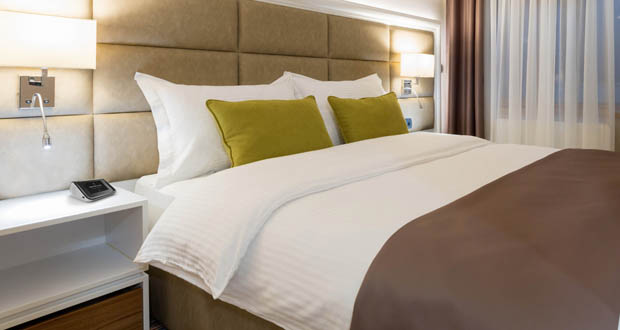
While hotels are notorious for being slow to integrate new technology, that doesn’t negate the fact that some amenities are quickly becoming outdated and are in need of a more modern replacement. As such, there are companies out there looking to disrupt the hospitality space and introduce cutting-edge tech in areas from operations to guest services. Cam Urban, CEO and co-founder of Roxy—a company that created a fully customizable, digital in-room concierge of the same name—spoke with LODGING about why hotels may be hesitant to embrace new technology and why it’s so important to stay on top of innovation and incorporate it into a hotel’s processes sooner rather than later.
Roxy is constantly introducing new capabilities. What are some recent updates?
Recently, our focus has largely been on consolidating items in the room, and as a result, we’ve replaced or eliminated some hard costs. Perhaps our most interesting new capability is Roxy’s ability to take over for the guestroom phones. In our experience, hoteliers are constantly looking to replace the phone because it’s expensive and almost never used; it’s only there for front desk and emergency calls. But as long as hotels provide the functionality of a phone, the phone itself can be eliminated. Now, Roxy can replace that phone.
But that isn’t the only hard cost we’ve been able to eliminate. We recently released an alarm clock mode that can be set manually or by voice. Roxy has a night mode that makes the clock visible when an alarm is set, but the lighting isn’t disruptive. In addition, we added charging ports to both sides of the device, a digital screen that can relay information and engaging content from the hotel, and a streaming system with high-quality speakers. This eliminates hotel alarm clocks, speakers, charging ports, and guest booklets. With budget considerations, operational efficiencies, and cost savings in mind, the goal is to make this a no-brainer. We understand that voice technology is new. We understand that one of the key benefits is improving the guest experience. But from a cost-savings perspective, this is much more efficient.
Why do you think the hotel industry has been so slow to get rid of outdated tech?
I think that the proposition of doing something different can be a little offputting, initially. But there are wells to get more comfortable with new technology. First, hoteliers need to learn about their options. Eliminating the hotel phone isn’t easy unless there’s a viable alternative. There are are also legal liability reasons to keep a phone. Hotels care about accessibility and need to cater to the needs of every type of guest, even if it’s just that 1 percent of the population that wouldn’t be able to make an emergency call without a hotel phone. Similarly, 95 percent of guests don’t need an alarm clock because they use their cell phones, but maybe 5 percent of guests need that amenity. The hotel industry has the challenge of having very specific expectations and standards. Hotels need to cater to all demographics, and it’s hard to deviate from those standards and expectations.
A second reason is that general managers don’t like to implement new optimizations when what already exists is safe and successful. Betting on technology when its ROI isn’t clear is obviously a larger risk. When general managers get promoted or move to a new property, they typically maintain the operations but make small improvements. Making bigger improvements by changing some efficiencies may involve some risk, but it also provides more revenue optimization opportunities. It’s a matter of finding something new outside of their comfort zones.
What innovations do you see for a device like Roxy in the future?
The moment most items go into a hotel room, they start depreciating in value. The TV, the alarm clock, the phone, and all other amenities depreciate. We wanted to make Roxy an exception. Devices with artificial intelligence, like Roxy, get smarter over time, always improving capabilities, functionality, and intelligence. It’s valuable to invest in this kind of technology, and artificial intelligence continues to evolve and improve every day. In hotels specifically, staff members are constantly asked the top 10 questions over and over again, including requests for fresh towels, WiFi passwords, and checkout questions. Not only can Roxy answer those, it can answer specialized questions and add value where it matters most. Those special requests might be booking transportation, restaurant reservations, tickets, and recommendations. The core deployment of Roxy is to improve and provide overall intelligence and functionality to relieve staff of menial and common questions and requests. That way, they can spend more time doing valuable work. Additionally, the visual display enables providing different types of content on the device and allows the creative freedom to help engage the guest experience. Guests can be prompted to initiate relevant conversations.
How important is customizability in today’s day and age for hotels?
It’s integral because hotels really try to distinguish their brand and voice, and all of those touch points with guests need to be consistent across all platforms. Imagine walking into a hotel and talking to two associates at the front desk. One just started a week ago and has never worked in hospitality, and the other is a 20-year hotel veteran. You’ll have very different conversations with those two people. We’re the latter. We’re that person that has all this deeply ingrained knowledge and shapes conversations with guests, knowing off the top of the head exactly what to recommend and personalize. That’s the difference.
To see a video of Roxy in action, click HERE. For more information, visit www.roxydevice.com.











